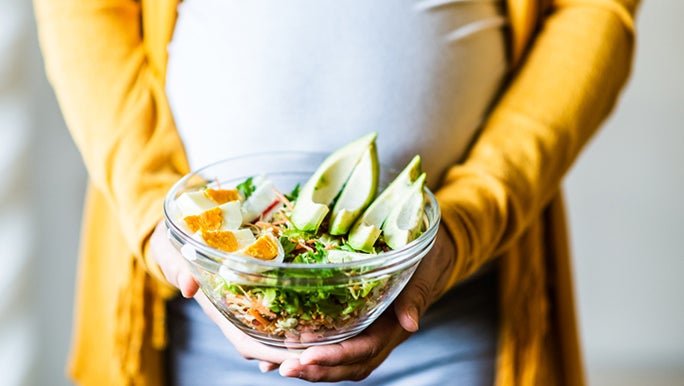Key Points
- Diet and nutrition have a vital role to play when it comes to supporting both male and female fertility
- A diet that supports fertility is quite similar to a regular healthy diet
- If you’re at all concerned about your fertility journey, your GP is the best place to start
So you’re trying to get pregnant. Congratulations! It’s an exciting time full of anticipation, but it can also come with a lot of advice, both good and bad. Alongside your research on the signs of ovulation, you’ve probably heard tips for following a special diet to support fertility.
We know it’s important for everyone to eat well, no matter their life stage. But a growing body of evidence points to a link between diet and fertility for women and men.
This is why we have enlisted the help of expert fertility Dietitian and Nutritionist Stefanie Valakas to help cut through the noise.
How can diet affect fertility – and why it’s not just women who need to eat well
First, the question of the day: can diet affect fertility? According to Stef, it’s a resounding yes.
“Diet and nutrition have an important role to play when it comes to both male and female fertility – both for people who are wanting to optimise their health and wellbeing prior to trying to conceive and for those who are facing some issues with conception,” she says.
With one in six Aussie couples experiencing infertility, it’s important to realise just how impactful a good diet can be.
And it’s not just women who are affected. With sperm problems affecting two in five couples, it’s also important to focus on foods that support male fertility.

Following a diet that supports fertility is important for both men and women when trying to conceive
First, try to focus on what you should eat rather than what to avoid
Before we get into the nitty-gritty of it all, it’s important to note that there are already a lot of stresses in pregnancy, so try not to let your diet become one of them.
“Focusing too closely on eating a perfect diet to support fertility can become a very slippery slope,” Stef says. Don’t hyper-focus on certain foods while trying to conceive.
“What we really want to be talking about is an overall way of eating.”
Focus on what you should be putting into your mouth instead of obsessing over what to avoid – just as you might research exercises to do to help support conception rather than focusing on what you can’t do.

Healthy foods like colourful fruits and vegetables, as well as nuts, may support fertility, especially for men
Best foods for supporting fertility
OK, so what should you be eating as part of a diet that supports fertility? Unsurprisingly, it’s quite similar to a regular healthy diet.
Focus on foods such as:
- colourful fruits and vegetables
- foods that are high in omega-3 fatty acids, like oily fish
- unsaturated fats like extra-virgin olive oil, olives and seeds
- nuts, particularly for men – nuts contain zinc, which is lost in each ejaculate
- foods high in folate – such as green leafy vegetables, lentils, beans, strawberries & oranges
- dietary fibre from wholegrains, legumes & beans, nuts, seeds, fruits and vegetables.
Should we switch to the Mediterranean diet? It’s so popular…
After reading the above list, you may be wondering, Should I just switch to a Mediterranean diet? After all, it seems to be the diet so many health experts are recommending these days.
Stef says the answer will vary between individuals. Not everyone has the time, energy or capacity to switch to a whole new way of eating. It takes effort, intention and work.
“The Mediterranean diet is certainly a healthy diet, but to get any kind of benefit from eating well in terms of fertility health, you need at least three to six months of eating that way,” she says.
“Some data is showing that nutrition isn't making a significant impact until six months, which is likely due to deficits that need to be bridged. Also, many people need to change body composition, for example reduce or gain fat, and that takes time. The longer we are working on our health and wellbeing, the better. So a sustainable diet is always going to be the best option.”
Vegans and vegetarians
People who eat vegan and vegetarian diets are at greater risk of nutrient deficiencies, so Stef’s advice is to work with a healthcare provider to ensure you’re getting what you need.
What women aged 35–40 should eat to support their fertility
When it comes to food to support fertility between the ages of 35 and 40, following an antioxidant-rich diet overall is sensible. But again, it’s important to consult a fertility dietitian.

Following a Mediterranean diet may be beneficial for fertility
Foods to avoid when trying to conceive
And now we come to the bad eggs of fertility foods – pun intended.
Research recommends that people hoping to conceive should avoid:
- saturated fats (found in butter, fatty cuts of meat, coconut oil, and palm oil products) as they are known to be inflammatory and have negative effects on both egg and sperm health
- processed meats like bacon, ham and salami
- added sugar and overly processed foods as they can interfere with sperm and egg quality as well as implantation because of advanced glycated end products – harmful compounds formed when protein or fats combine with sugar in the bloodstream
- alcohol, for both men and women
Focus on eating a healthier diet and enjoy yourself!
There are certainly some foods that we should be including more often when trying to conceive. But at the end of the day, it’s really about sticking to a healthy and nutritious diet.
And don’t get too bogged down in the details. “Don’t think, I had a square of chocolate and now I can’t get pregnant this month, because it’s just not the case,” says Stef.
If you’re at all concerned about your fertility journey, your GP is the best place to start. For more tips on good nutrition to support fertility, see our ways to eat – focus on fertility program.
Related:
Stefanie Valakas is an Accredited Practising Dietitian and nutritionist and the director of The Dietologist, a virtual nutrition practice dedicated to reproductive health, fertility and pregnancy health. She also hosts the podcast, Fertility Friendly Food.
Reviewed by the healthylife Advisory Board December 2022.



